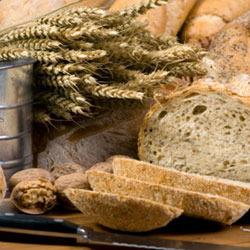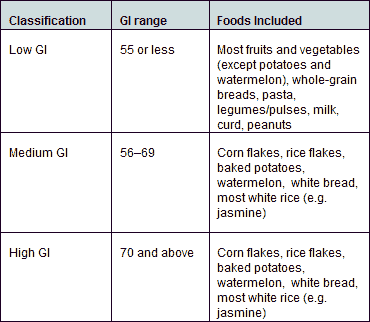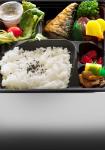
Not all carbohydrates affect your body in the same manner, which is why you should be selective about what you consume.
Carbohydrates should form an essential part of your diet. This is because foods in this class are an important source of nutrients, fibre and energy. In fact, around 40-65 percent of your daily calorie intake should come from carbohydrates. However, it is important that you choose healthy carbs that don't cause marked fluctuations in your blood glucose levels.
All carbohydrates do not affect blood glucose levels similarly. For instance, carbohydrates present in white bread, polished rice, confectionary products, bakery goods and other highly processed foods -- which are rapidly assimilated into the blood stream -- cause a sharp spike in blood glucose levels immediately after eating them. In contrast, whole grains and beans are digested more slowly and cause only a gradual rise in blood sugar.
The impact of various carbohydrates on blood sugar levels is measured on a scale of 0-100, called the glycemic index (GI). Based on this, foods which cause a rapid rise in blood glucose are rated on the higher end of the scale, while those which cause a minimal rise fall to the lower end. So while white bread and pastries have high GI values of 70 or above, whole grains or beans have lower GI values of 50 or less.
High GI foods are usually associated with unhealthy consequences such as obesity or onset of diabetes and are preferably avoided. Low GI foods, on the other hand, are healthy because they induce only small variations in blood glucose and insulin levels, help to maintain an ideal body weight and, in the long run, reduce the risk of diabetes and heart disease. Besides reducing hunger pangs, low GI foods also prolong physical endurance and help re-fuel carbohydrate stores after exercise.
The GI of foods is determined by a variety of factors. Consider these points to help you make the right choice:
- Amount of processing: Unprocessed foods have the lowest GI scores, while highly processed foods have the highest. Refining processes like milling and grinding get rid of the bran and germ layers, which have the maximum fibre, vitamins and minerals. The starchy endosperm which is left behind, though it provides energy, has very little nutrition. Similarly, finely ground grains or flours have higher GI than coarsely ground ones, which are the healthier choice.
- Starch type: Starches vary in the ease and rapidity with which they are broken down by the body into sugar. White rice, for example, contains starch that is rapidly assimilated and causes wide fluctuations in blood sugar after ingestion, in comparison to brown rice which releases sugar more gradually.
- Fibre content: Carbohydrates that contain a high proportion of dietary fibre are broken down more slowly into sugar. Thus foods that are rich in fibre generally have a lower GI rating and are healthier.
- Level of ripeness: Generally ripe fruits and vegetables have a higher GI than raw or less ripe ones.
Classification of foods based on GI

Low GI foods that are common in the Indian diet include chana dal, rajma, peanuts, milk, curd, vermicelli, tomatoes, okra, cabbage, radish, eggplant, onions, spinach and other leafy green vegetables.
Here are some tips to help you eat healthier carbs:
- Eat natural: Choose vegetables, whole grains, brown rice or oats over processed foods. They are not only high in bran and fibre but are also rich in vitamins and minerals. So for a snack, opt for raw, chopped vegetables like cucumber and carrot sticks instead of chips and chocolates. Also substitute legumes or beans in place of meat.
- Avoid sugar: Aerated drinks, candy, ice cream and mithai all contribute significantly to the body's glycemic load as well as to weight gain. Whole fruits are healthier than fruit juices, which lack fibre and often contain added sugar.
- Restrict fat: Instead of frying foods such as potatoes, try boiling, baking, roasting or other healthier ways of cooking. Also have chapatis, dal, rice and other healthy foods without dousing them in oil or ghee.







 © 2025
© 2025